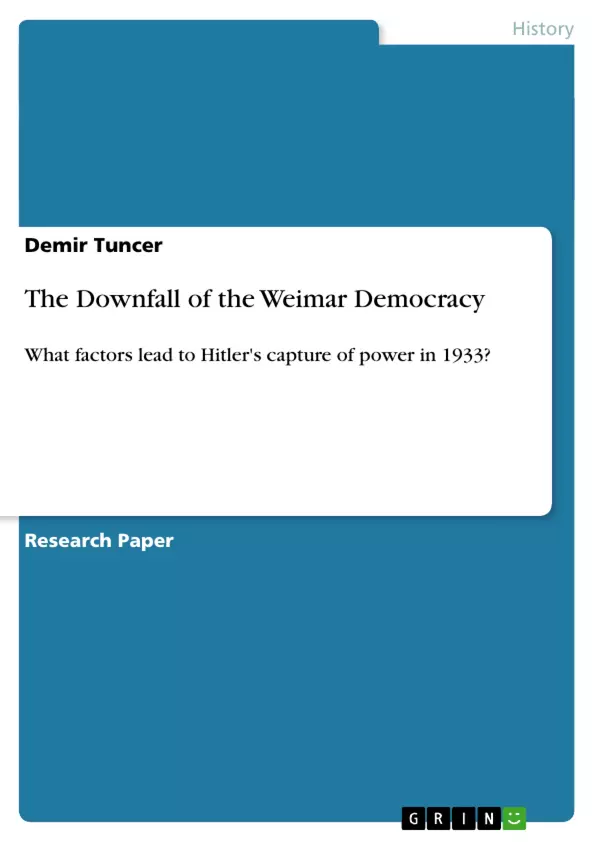An scholarly examination of the Factors that Lead to Adolf Hitler's Capture of Power in 1933, and subsequently to the Downfall of the Weimar Republic.
Inhaltsverzeichnis (Table of Contents)
- Introduction
- The Pre-Weimar Era
- The Weimar Republic
- Political Unrest and Economic Instability
- The Rise of the Nazi Party
- Hitler's Capture of Power
Zielsetzung und Themenschwerpunkte (Objectives and Key Themes)
This essay aims to analyze the factors that led to the downfall of the Weimar Republic and the subsequent rise of Adolf Hitler's Nazi regime in Germany. It explores the socio-political and economic landscape of Germany in the 1920s and early 1930s, focusing on the instability and disorder that paved the way for Hitler's ascension to power.
- The impact of the Versailles Peace Treaty on Germany's post-World War I political and economic landscape
- The struggles of the Weimar Republic, including political unrest and economic instability, particularly hyperinflation and long-term debt
- The rise of the Nazi Party and Hitler's political career
- The role of the Great Depression in accelerating the downfall of the Weimar Republic
- The significance of the Enabling Act of 1933 in granting Hitler dictatorial powers
Zusammenfassung der Kapitel (Chapter Summaries)
The essay begins by examining the pre-Weimar era, highlighting the impact of World War I and the Versailles Peace Treaty on German society. It then analyzes the challenges faced by the Weimar Republic, including political instability and economic woes, particularly hyperinflation. The paper also explores the development of the Nazi Party and Hitler's political ascent. It concludes by examining Hitler's capture of power in 1933 and the subsequent demise of the Weimar Republic.
Schlüsselwörter (Keywords)
The essay focuses on the keywords and themes of the Weimar Republic, the Nazi Party, Adolf Hitler, the Versailles Peace Treaty, political instability, economic crisis, the Great Depression, and the Enabling Act of 1933.
Frequently Asked Questions
What led to the downfall of the Weimar Republic?
Key factors included extreme political unrest, economic instability (hyperinflation), the impact of the Versailles Treaty, and the devastating effects of the Great Depression.
How did the Versailles Treaty affect Germany?
The treaty imposed heavy reparations and territorial losses, which caused deep resentment among the German population and weakened the legitimacy of the new democracy.
What was the significance of the Enabling Act of 1933?
The Enabling Act (Ermächtigungsgesetz) gave Adolf Hitler the power to enact laws without the consent of the Reichstag, effectively turning Germany into a dictatorship.
How did economic crisis help the Nazi Party?
Hyperinflation and mass unemployment during the Great Depression led many voters to turn away from moderate parties and support extremist groups like the NSDAP.
When did Hitler officially capture power?
Adolf Hitler was appointed Chancellor of Germany on January 30, 1933, which marked the beginning of the end for the Weimar Republic.
- Arbeit zitieren
- Demir Tuncer (Autor:in), 2009, The Downfall of the Weimar Democracy, München, GRIN Verlag, https://www.grin.com/document/214280



